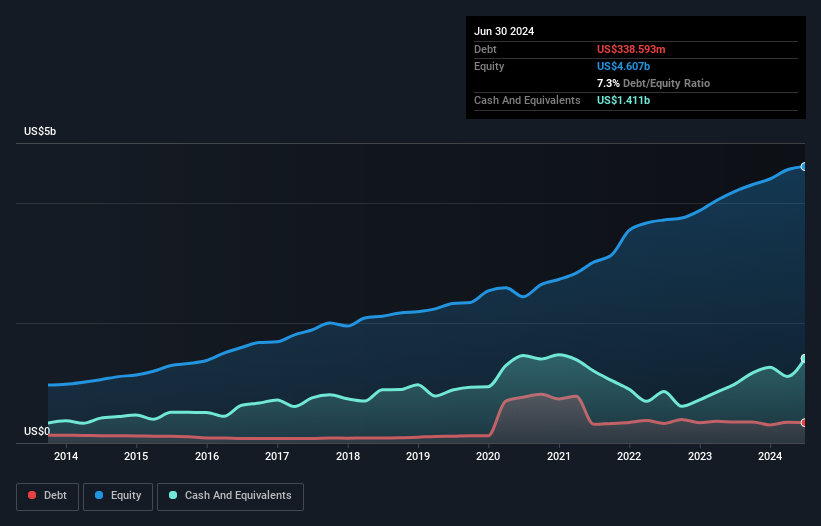
The external fund manager backed by Berkshire Hathaway's Charlie Munger, Li Lu, makes no bones about it when he says 'The biggest investment risk is not the volatility of prices, but whether you will suffer a permanent loss of capital.' So it seems the smart money knows that debt - which is usually involved in bankruptcies - is a very important factor, when you assess how risky a company is. Importantly, Skechers U.S.A., Inc. (NYSE:SKX) does carry debt. But the real question is whether this debt is making the company risky.
Why Does Debt Bring Risk?
Generally speaking, debt only becomes a real problem when a company can't easily pay it off, either by raising capital or with its own cash flow. Ultimately, if the company can't fulfill its legal obligations to repay debt, shareholders could walk away with nothing. However, a more frequent (but still costly) occurrence is where a company must issue shares at bargain-basement prices, permanently diluting shareholders, just to shore up its balance sheet. Having said that, the most common situation is where a company manages its debt reasonably well - and to its own advantage. When we examine debt levels, we first consider both cash and debt levels, together.
View our latest analysis for Skechers U.S.A
What Is Skechers U.S.A's Debt?
As you can see below, Skechers U.S.A had US$338.6m of debt, at June 2024, which is about the same as the year before. You can click the chart for greater detail. However, its balance sheet shows it holds US$1.41b in cash, so it actually has US$1.07b net cash.

How Healthy Is Skechers U.S.A's Balance Sheet?
The latest balance sheet data shows that Skechers U.S.A had liabilities of US$2.06b due within a year, and liabilities of US$1.31b falling due after that. Offsetting this, it had US$1.41b in cash and US$1.11b in receivables that were due within 12 months. So its liabilities outweigh the sum of its cash and (near-term) receivables by US$852.1m.
Since publicly traded Skechers U.S.A shares are worth a very impressive total of US$10.3b, it seems unlikely that this level of liabilities would be a major threat. Having said that, it's clear that we should continue to monitor its balance sheet, lest it change for the worse. While it does have liabilities worth noting, Skechers U.S.A also has more cash than debt, so we're pretty confident it can manage its debt safely.
Also positive, Skechers U.S.A grew its EBIT by 30% in the last year, and that should make it easier to pay down debt, going forward. When analysing debt levels, the balance sheet is the obvious place to start. But ultimately the future profitability of the business will decide if Skechers U.S.A can strengthen its balance sheet over time. So if you're focused on the future you can check out this free report showing analyst profit forecasts.
But our final consideration is also important, because a company cannot pay debt with paper profits; it needs cold hard cash. Skechers U.S.A may have net cash on the balance sheet, but it is still interesting to look at how well the business converts its earnings before interest and tax (EBIT) to free cash flow, because that will influence both its need for, and its capacity to manage debt. Looking at the most recent three years, Skechers U.S.A recorded free cash flow of 41% of its EBIT, which is weaker than we'd expect. That's not great, when it comes to paying down debt.
Summing Up
We could understand if investors are concerned about Skechers U.S.A's liabilities, but we can be reassured by the fact it has has net cash of US$1.07b. And it impressed us with its EBIT growth of 30% over the last year. So we don't think Skechers U.S.A's use of debt is risky. Of course, we wouldn't say no to the extra confidence that we'd gain if we knew that Skechers U.S.A insiders have been buying shares: if you're on the same wavelength, you can find out if insiders are buying by clicking this link.
When all is said and done, sometimes its easier to focus on companies that don't even need debt. Readers can access a list of growth stocks with zero net debt 100% free, right now.
New: Manage All Your Stock Portfolios in One Place
We've created the ultimate portfolio companion for stock investors, and it's free.
• Connect an unlimited number of Portfolios and see your total in one currency
• Be alerted to new Warning Signs or Risks via email or mobile
• Track the Fair Value of your stocks
Have feedback on this article? Concerned about the content? Get in touch with us directly. Alternatively, email editorial-team (at) simplywallst.com.
This article by Simply Wall St is general in nature. We provide commentary based on historical data and analyst forecasts only using an unbiased methodology and our articles are not intended to be financial advice. It does not constitute a recommendation to buy or sell any stock, and does not take account of your objectives, or your financial situation. We aim to bring you long-term focused analysis driven by fundamental data. Note that our analysis may not factor in the latest price-sensitive company announcements or qualitative material. Simply Wall St has no position in any stocks mentioned.
About NYSE:SKX
Skechers U.S.A
Designs, develops, markets, and distributes footwear for men, women, and children worldwide.
Undervalued with adequate balance sheet.

